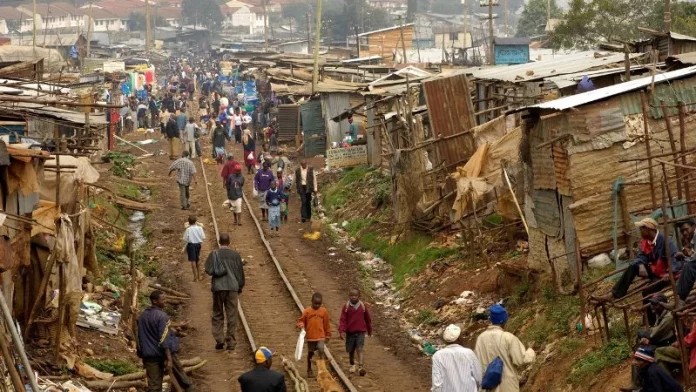As more people continue to suffer from poverty, it becomes increasingly clear that President Major General Muhammadu Buhari (retd) has failed to revive the economy.
Tellingly, the National Bureau of Statistics 2022 Multidimensional Poverty Index, which was just issued, reveals that 133 million Nigerians, or 62.9% of the country’s population, live in poverty and struggle with insecurity, energy scarcity, and financial hardship. Buhari and other regime players need to quit pretending everything is OK and come up with fresh, practical solutions to the poverty scourge.
Actually, the NBS merely quantified Nigerians’ terrifying experiences. The survey found that the majority of Nigerians “are multidimensionally poor and cook with dung, wood, or charcoal, instead of clean energy,” based on various factors, including health, living standards, education, security, and unemployment. Additionally, there are significant national disparities in housing, healthcare, food security, and cleanliness.
The MPI survey carried out between November 2021 and February 2022, sampled 56,000 homes from 36 states and the Federal Capital Territory.
Also Read: The Situation of Girls’ Education in Nigeria
Despite becoming pervasive throughout the country, rural residents, women, and children are the most affected. Of children aged 0–17, 67.5 percent are multi-dimensionally poor, and 51% of the country impoverished are children. Disparities by area and by geography are likewise very diverse. 90% of children live in poverty in rural areas where 70% of the population is concentrated. This is hardly unexpected given that the majority of kids lack the intellectual stimulation essential for early childhood development and that many hinterland villages lack access to basic facilities. Rural residents experience poverty at a rate of 72% compared to urban residents’ 42%, and their level of poverty is likewise 42% compared to urban residents’ 37%.
Multidimensional poverty is most prevalent in the North, with rates of 76.5% in the North-East, 75.8% in the North-West, and 66.3% in the North-Central, in line with trends in human development indexes. The South-South region has a high poverty rate of 62.6%, and even while the South-East and South-West have the lowest rates nationwide, at 49% and 40%, respectively, they are still greater than the international poverty line of 26%.
Unfortunately, the Buhari administration continues to pursue misguided policies, deny reality, and ignore opportunities to remove obstacles to job creation and productive activity by focusing instead on high-hanging fruit. Through waste, corruption, and ineptitude, the state governors solidify the restrictive, centralizing governing structure. They don’t have any comprehensive, independent economic strategies that concentrate on promoting independence, production, private investment, job development, and poverty alleviation. Poverty is a result of this.
Buhari Promise in 2019
Buhari’s pledge to implement programs to help 100 million Nigerians escape poverty by 2030—10 million each year starting in 2020—sounds hollow. With 87 million impoverished people as of early this year, Nigeria has overtaken India as the country with the most extreme poverty, the World Bank reports. Between January and September of this year, three million additional Nigerians fell into extreme poverty, pushing the country’s total to 95.1 million.
To be fair, failure isn’t the result of a lack of effort: in addition to inherited programs like the National Poverty Eradication Programme, the Youth Empowerment Scheme, and the Rural Infrastructure Development Scheme, the Buhari administration also started the National Social Investment Programme, a project whose components include N-Power, the Conditional Cash Transfer, the Government Enterprise and Empowerment Programme, the TraderMoni scheme, and the Home-Grown School Feeding Program. Separately, these aim to provide resources to the most vulnerable population groups, such as women, young people, and children, as well as to encourage self-employment.
All have crashed; poverty and unemployment are rushing, not abating. The $300 million the government said it provided to 10 million families (at N5,000 apiece per month) in the four years leading up to January 2022 (at a rate driven by sectionalism and corruption) has not had a substantial impact. According to a recent prediction, by year’s end, 7.0 million additional people would be living in extreme poverty. According to some researchers, the present unemployment rate of 33.3% might increase to 40% by December. In the crucial youth population, 53.4% of people are unemployed, according to Statista.
Also Read: Tackling Insecurity: Soludo Has Done a Lot, Has More To Offer
Moreover, the COVID-19 pandemic and its worldwide economic fallout, turbulent global markets, floods and insecurity have afflicted all countries, including Nigeria. But the country makes wrong choices.
Buhari and the governors must move quickly to avert Bloomberg’s dire prediction that, absent changes, Nigeria would soon be home to 25% of the world’s impoverished. The recommendation of experts is for quick, persistent economic programs, basic health care and sanitation, education, job access, encouraging equality and entrepreneurship, empowering the extremely poor, and facilitating access to ICT and innovation.
The non-profit Borgen Project, in a 2019 analysis, links investments in education, diversification, export promotion, mining, luring private investment, and tenaciously implementing national development goals to the success in reducing poverty in Ghana, Norway, Singapore, Bolivia, and South Korea.
Also Read: Nigeria: The Results of Emigration
Nigeria should also choose efficient, honest, and transparent privatization right away, drastically increase business friendliness to draw foreign direct investment, put in place effective policies to support start-ups, SMEs, agriculture, mining, and ICT, and overhaul its revenue/tax collecting system.
The federal and state governments ought to entice domestic and FDI investment in ports, airports, mining, agriculture, industry, railroads, and power. There must be a solution to the electricity mess. To release money for social investment, the cost of governance needs to dramatically reduced. Uncertainty must overcome.
The states should also put a priority on building rural infrastructure and develop independent, self-sufficient economic plans that emphasize exports, private investment, agriculture, SMEs, and job development. Governments should not give up until poverty is greatly reduced.

